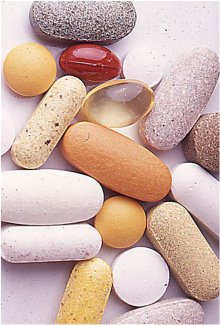 Elevated selenium levels in the blood may worsen prostate cancer in some men who already have the disease, according to a study by researchers at Dana-Farber Cancer Institute. The higher risk of more-aggressive prostate cancer was seen in men with a certain genetic variant found in about 75 percent of the prostate cancer patients in the study.
Elevated selenium levels in the blood may worsen prostate cancer in some men who already have the disease, according to a study by researchers at Dana-Farber Cancer Institute. The higher risk of more-aggressive prostate cancer was seen in men with a certain genetic variant found in about 75 percent of the prostate cancer patients in the study. Paradoxically, the 25 percent of men with a different variant of the same gene and who also had high selenium levels were at 40 percent lower risk of aggressive disease. The variants are slightly different forms of a gene that instructs cells to make manganese superoxide dismutase (SOD2), an enzyme that protects the body against harmful oxygen compounds.
"If you already have prostate cancer, it may be a bad thing to take selenium," said Philip Kantoff, senior author of the study that is published in the Journal of Clinical Oncology. The unexpected results are the first to raise concern about this potentially harmful consequence of taking supplemental selenium. "These findings are interesting particularly in light of the recent negative results from the SELECT prevention study, which asked if selenium could protect against prostate cancer," noted Kantoff.
Small amounts of selenium are essential for health: 40 to 70 micrograms is the recommended daily intake. In recent years, supplemental selenium has been sold and promoted as a means of preventing prostate cancer, largely based on observational studies that found higher risk of prostate cancer incidence and mortality in areas of the country that are naturally low in selenium.
However, research aimed at confirming the benefits of selenium supplementation have been mixed. Recently, the SELECT study, which involved 35,000 men, was halted early when, after more than five years, it showed that the supplements didn't affect the incidence of prostate cancer.
Previous studies had found that the risk of developing prostate cancer was modified by a strong interaction between SOD2 and selenium. The new research was designed to look at the effect of this interaction on men already diagnosed with prostate cancer.
The researchers found that simply having a high level of selenium was associated with a slightly elevated risk of aggressive prostate cancer. But the risk was much more strongly affected by the interaction of selenium levels and whether the patient had a certain variant of the SOD2 gene. Men with the highest selenium levels and the "AA" form of the SOD2 gene were 40 percent less likely to have been diagnosed with aggressive prostate cancer than the men with same gene form but low levels of selenium.
But for men carrying the "V" form of the gene, selenium had the opposite effect. In these men, those with the highest levels of selenium in their blood were about twice as likely to have an aggressive type of prostate cancer as their counterparts with low selenium levels.
"Among the 25 percent of men with the AA genotype, having greater selenium levels may protect against aggressive disease," the study concluded. "However, for the 75 percent of men who carry a V allele, higher selenium levels might increase the likelihood of having worse characteristics."
The results may seem counterintuitive to the public, who have been told for years that antioxidants can help people live longer, healthier lives with a lowered risk of cancer. However, Kantoff says, "There is some precedent to this - research has suggested that antioxidants could be protective if you don't have cancer, but once you do, then antioxidants may be a bad thing."
Related:
Selenium And Prostate Cancer: What's The Link?
Selenium May Help Prevent Prostate Cancer
Source: Dana-Farber Cancer Institute

